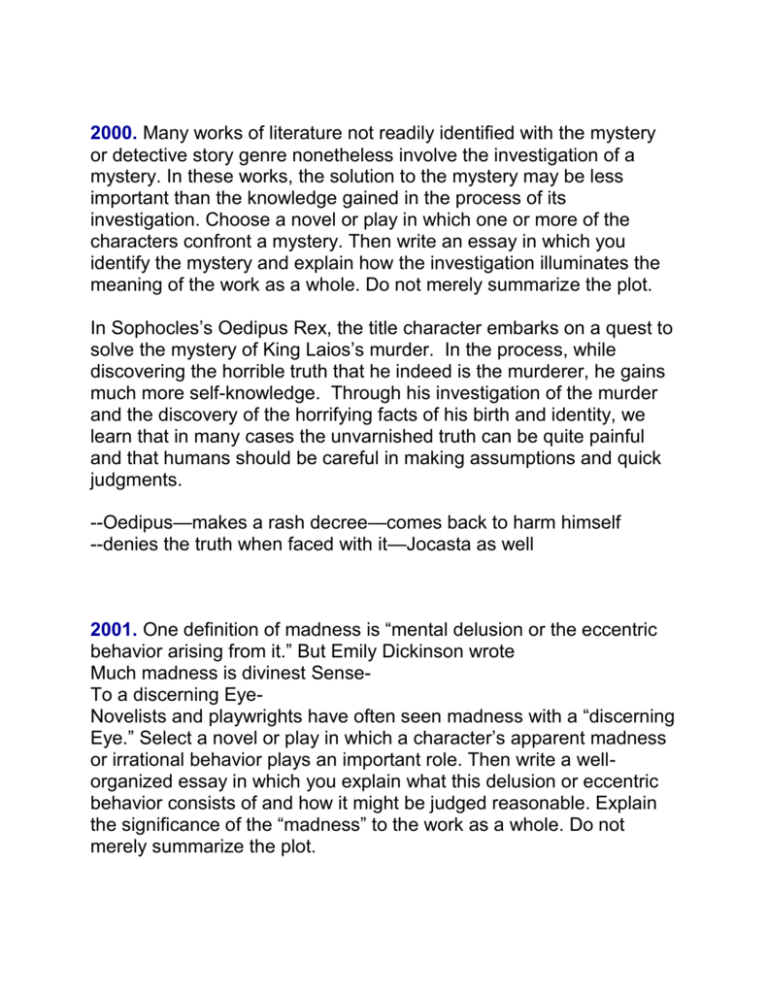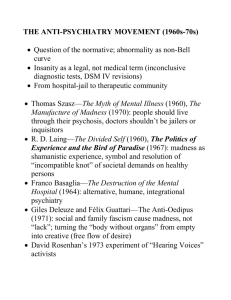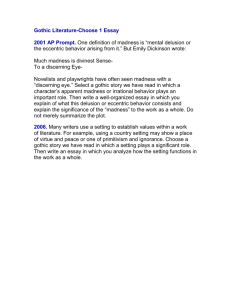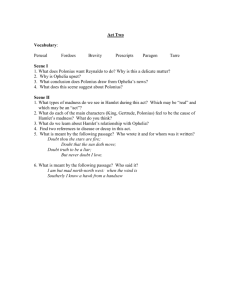Hamlet prompt practice
advertisement

2000. Many works of literature not readily identified with the mystery or detective story genre nonetheless involve the investigation of a mystery. In these works, the solution to the mystery may be less important than the knowledge gained in the process of its investigation. Choose a novel or play in which one or more of the characters confront a mystery. Then write an essay in which you identify the mystery and explain how the investigation illuminates the meaning of the work as a whole. Do not merely summarize the plot. In Sophocles’s Oedipus Rex, the title character embarks on a quest to solve the mystery of King Laios’s murder. In the process, while discovering the horrible truth that he indeed is the murderer, he gains much more self-knowledge. Through his investigation of the murder and the discovery of the horrifying facts of his birth and identity, we learn that in many cases the unvarnished truth can be quite painful and that humans should be careful in making assumptions and quick judgments. --Oedipus—makes a rash decree—comes back to harm himself --denies the truth when faced with it—Jocasta as well 2001. One definition of madness is “mental delusion or the eccentric behavior arising from it.” But Emily Dickinson wrote Much madness is divinest SenseTo a discerning EyeNovelists and playwrights have often seen madness with a “discerning Eye.” Select a novel or play in which a character’s apparent madness or irrational behavior plays an important role. Then write a wellorganized essay in which you explain what this delusion or eccentric behavior consists of and how it might be judged reasonable. Explain the significance of the “madness” to the work as a whole. Do not merely summarize the plot. In Shakespeare’s hamlet, the title character spends much of the play hovering between a feigned madness and possibly a true delusional state. Regardless of whether his actions are an “antic disposition” as he tells his friends he will enact, or “the coinage of a heat-oppress’d brain,” as his mother states, the fact is that despite his madness, Hamlet sees the truth about most characters in the play, including himself, in ways that other characters cannot, thus proving the veracity of Dickinson’s quotation. 2007, Form B. Works of literature often depict acts of betrayal. Friends and even family may betray a protagonist; main characters may likewise be guilty of treachery or may betray their own values. Select a novel or play that includes such acts of betrayal. Then, in a well-written essay, analyze the nature of the betrayal and show how it contributes to the meaning of the work as a whole. In Shakespeare’s Hamlet, the bulk of the play hinges upon betrayal, with the tragic conclusion to the play illustrating that the ultimate consequences are negative for betrayer and betrayed. Whether it is the greedy and lustful Claudius, the fair and innocent Ophelia, or the well-meaning but scheming Polonius, every single character is touched by the concepts of deception and betrayal. --Claudius betrays Old Hamlet, Hamlet, and Gertrude --Rosencrantz and Guildenstern try to betray Hamlet --Hamlet betrays Ophelia and Laertes (though unwittingly)






